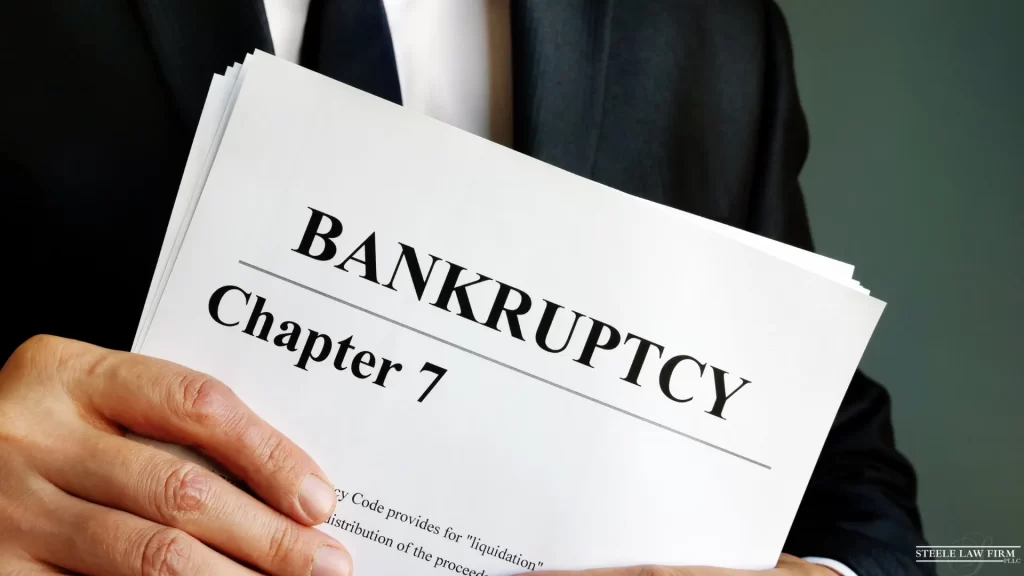When considering bankruptcy, many individuals may wonder, “What cannot be wiped out by bankruptcies?” While bankruptcy can provide a fresh start by eliminating certain types of debt, not everything can be discharged. Understanding what cannot be wiped out is crucial before you decide if bankruptcy is the right option for you. Some debts, like student loans and child support, are typically excluded from bankruptcy protection.
An Irving bankruptcy lawyer from the Steele Law Firm, PLLC, understands how knowing which debts will not be erased can help you make an informed decision about whether bankruptcy is truly the right solution for you and your financial struggles.

Bankruptcy can be a powerful tool to get out from under overwhelming debt, but it does not erase everything. Some debts stick with you, no matter which type of bankruptcy you file. If you are facing this consideration, you are not alone. In 2024, filings for bankruptcy rose by 14.2 percent. It is important that you understand which financial obligations won’t go away so that you can plan accordingly and avoid surprises down the road.
In most cases, student loans are not discharged in bankruptcy. They can only be wiped out if you prove that repaying them would cause “undue hardship,” which is a difficult standard to meet. Courts are strict about this, so most people still have to pay their student loans even after bankruptcy.
Bankruptcy will not help with court-ordered family support payments. If you owe alimony or child support, you are still legally required to pay them in full. These obligations are considered a priority and are not eligible for discharge under any type of bankruptcy.
Many tax debts may not be erased in bankruptcy. Recent income tax debts, payroll taxes, and fraud-related tax obligations typically remain after filing. Older income taxes may be dischargeable under certain conditions, but it depends on your individual case.
Fines that are related to criminal activity or restitution ordered by a court must be paid, even after bankruptcy. These include things like DUI-related debts, court fines, and compensation owed to victims.
If you have a mortgage or car loan and want to keep the house or car, you still have to make payments. Bankruptcy doesn’t erase the debt tied to property you choose to keep. If you stop paying, the lender can repossess or foreclose.
Knowing what debts bankruptcy won’t erase is just as important as knowing what will. This knowledge can help you better understand how bankruptcy fits into your overall financial strategy.
While bankruptcy may not erase everything, it can still provide meaningful relief by removing many unsecured debts and giving you space to regroup. Take time to review your financial situation, stay informed, and make decisions that support your long-term stability. Staying educated and proactive can help you regain control and build a stronger financial foundation ahead.
A: Bankruptcy can eliminate many types of unsecured debts, such as credit card balances, medical bills, and personal loans. In Chapter 7, most of these debts are wiped out entirely. Chapter 13 allows you to repay some debts through repayment plans, but remaining unsecured debts may be discharged at the end. However, not all debts go away.
A: Some types of debt cannot be wiped out in bankruptcy. Common examples include student loans, child support, alimony, and most tax debts. Additionally, debts from fraudulent activity or fines from criminal cases are not discharged. Certain secured debts, like mortgages or car loans, may remain if you choose to keep the property. It is vital that you understand which of your debts is eligible for discharge.
A: Not everyone is eligible for bankruptcy. Your income must be below the state median, or you must pass the means test to qualify for Chapter 7. If your income is higher, you may need to file Chapter 13, which involves a repayment plan. You also cannot file if you have recently filed for bankruptcy, as there are waiting periods. Additionally, certain debts, like child support and student loans, cannot be discharged.
A: Mortgages are generally not forgiven in bankruptcy. In Chapter 7, you may have to surrender the home if you cannot keep up with payments, but the mortgage debt itself isn’t erased. In Chapter 13, you can keep your home by creating a repayment plan to catch up on overdue payments, but the mortgage debt remains. Bankruptcy can still help reduce the overall burden as it can eliminate other debts, which can make it easier to manage your mortgage payments.
A: You don’t have to work with a lawyer to file for bankruptcy, but it is recommended. Filing for bankruptcy involves complex paperwork and legal procedures that can be challenging to navigate on your own. An experienced bankruptcy lawyer can help ensure all documents are correct, prevent mistakes, and advise you on the ideal type of bankruptcy, given your situation. While you can file without one, having legal guidance can make the process smoother and increase your chances of success.
While bankruptcy can provide much-needed relief from many types of debts, it is important to understand that some debts, like student loans, child support, and certain taxes, cannot be wiped out. Knowing what won’t be discharged helps you to make a more informed decision about your financial future.
If you are unsure about how bankruptcy will affect your specific situation or need guidance on alternatives, set up an initial consultation with a trusted lawyer from the Steele Law Firm, PLLC, today. A seasoned bankruptcy lawyer can give you tailored advice on your situation and help you understand your ideal options moving forward.




